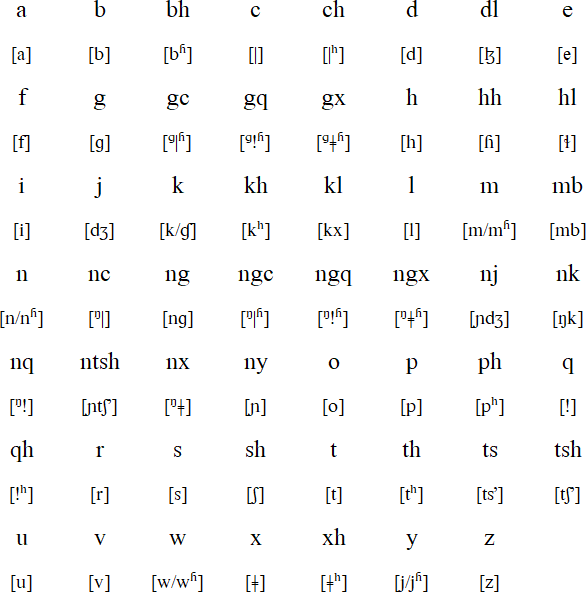Zulu is a Southern Bantu language spoken by about 27.7 million people, mainly in South Africa. In South Africa there are about 11.6 million native speakers of Zulu, and another 15.7 million people speak it as a second language. It is spoken mainly in the province of KwaZulu-Natal, and also in Mpumalanga, Free State, Gauteng and Eastern Cape provinces. There are also about 328,000 Zulu speakers in Lesotho, 108,000 in Eswatini, 37,500 in Malawi, 4,600 in Botswana and 3,000 in Mozambique.
Zulu is one of the national languages of South Africa, and a statutory provincial language in Gauteng and KwaZulu-Natal provinces. It taught in schools, and used since the 1980s on television, radio and in newspapers. The first full-length feature film in Zulu was released in 2005.
During the early 19th century Christian missionaries, including J W Colenso, S B Stone, H Callaway and Lewis Grant devised a way to write Zulu. The first Zulu Christian booklet Incwadi Yokuqala Yabafundayo was written by Newton Adams, George Newton and Aldin Grout between 1837-8 and explained the spelling of Zulu words and the history of the Old Testament. The first Zulu version of the Bible was produced between 1845-1883, and the first Zulu grammar book was publish in 1850 by the Norwegian missionary Hans Schreuder. The first novel in Zulu, Insila kaShaka, was published by John Dube in 1930

Download an alphabet chart for Zulu (Excel)
Corrections to Zulu pronunciation by Michael Peter Füstumum
Bonke abantu bazalwa bekhululekile belingana ngesithunzi nangamalungelo. Bahlanganiswe wumcabango nangunembeza futhi kufanele baphathane ngomoya wobunye.
A recording of this text by Cynthia Nozwelo
All human beings are born free and equal in dignity and rights. They
are endowed with reason and conscience and should act towards one another
in a spirit of brotherhood.
(Article 1 of the Universal Declaration of Human Rights)
See more videos like this on Wikitongues
Information about Zulu | Phrases | Numbers | Family Words | Tongue twisters | Tower of Babel | Songs | Zulu courses on: Amazon.com and Amazon.co.uk [affilate links]
Information about the Zulu language
http://en.wikipedia.org/wiki/Zulu_language
http://africanlanguages.com/zulu/
https://www.ethnologue.com/language/zul
Zulu language lessons
http://zulumaiden.podomatic.com
http://ilanguages.org/zulu.php
http://learn101.org/zulu.php
http://mylanguages.org/learn_zulu.php
https://www.twinkl.co.za/resources/south-africa-resources/isixhosa-foundation-phase-english-south-africa-suid-afrika/2
Zulu phrases
http://www.phrasebase.com/forum/read.php?TID=7760
http://www.linguanaut.com/english_zulu.htm
http://www.cyberserv.co.za/users/~jako/lang/zulwrd.htm
http://africanlanguages.com/zulu/
http://www.codezulu.com/isizulu.asp
http://saharanvibe.blogspot.com/2007/03/zulu-language.html
Recordings of Zulu sounds
http://isizulu.net/p11n/
Online Zulu dictionaries
http://isizulu.net
http://glosbe.com/zu/en/
Aka, Bafaw-Balong, Bangi, Basaa, Bemba, Bembe, Bena, Benga, Bhaca, Bube, Bukusu, Bulu, Central Teke, Chichewa, Chokwe, Chuwabu, Comorian, Dciriku, Digo, Duala, Eton, Ewondo, Fang, Ganda/Luganda, Gogo, Gusii, Gwere, Haya, Hehe, Herero, Ibinda, Ikizu, Ikoma, Jita, Kabwa, Kako, Kamba, Kiga, Kikuyu, Kimbundu, Kinyarwanda, Kirundi, Kisi, Kogo, Komo, Kongo, Konjo, Koti, Kukuya, Kunda, Kuria, Kwambi, Lambya, Lingala, Loma, Lozi, Luba-Katanga, Luchazi, Lunda, Luvale, Luyana, Makaa, Makonde, Makhuwa, Mandekan, Maore, Masaaba, Mbama, Mbere, Mbukushu, Mbunda, Mbuun, Mende, Mongo, Mpiemo, Mushungulu, Mwani, Nambya, Nande, Ngoni, Nkore, North Teke, Northern Ndebele (South Africa), Northern Ndebele (Zimbabwe), Northern Sotho, Nyamwezi, Nyakyusa, Nyemba, Nyole, Nyoro, Nyungwe, Nzadi, Oroko, OshiWambo, Pagibete, Punu, Ronga, Safwa, Sena, Sengele, Shona, Soga, Songe, Southern Ndebele, Southern Sotho, Sukuma, Swahili, Swati, Tanga, Tembo, Tonga, Tooro, Tshiluba, Tsonga, Tswa, Tswana, Tumbuka, Umbundu, Venda, Vili, Vwanji, Xhosa, Yakam, Yansi, Yao, Yasa, Yeyi, Zigula, Zinza, Zulu
Languages written with the Latin alphabet
Page last modified: 17.11.22
[top]
You can support this site by Buying Me A Coffee, and if you like what you see on this page, you can use the buttons below to share it with people you know.

If you like this site and find it useful, you can support it by making a donation via PayPal or Patreon, or by contributing in other ways. Omniglot is how I make my living.
Note: all links on this site to Amazon.com, Amazon.co.uk
and Amazon.fr
are affiliate links. This means I earn a commission if you click on any of them and buy something. So by clicking on these links you can help to support this site.
[top]